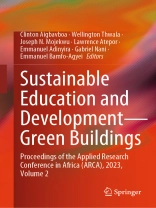This book is Volume 2 of the proceedings of 2023 Sustainable Education and Development Research Conference. This volume concentrates on papers in the area of green buildings.
Despite considerable progress, more than 700 million people worldwide still lack access to electricity, and around 2.4 billion people continue to use harmful and polluting fuels for cooking. While efforts have been made to promote renewable energy and energy efficiency, they have not been fast enough to achieve Sustainable Development Goal 7. Adding to the challenge, the ongoing war in Ukraine has contributed to rising global energy prices and heightened energy insecurity in Europe. In response to the energy crisis, some European countries are planning to accelerate the transition to renewables and increase investments in clean energy and energy efficiency. However, others are considering a resurgence of coal, which poses a risk to the overall green transition.
Between 2010 and 2020, the percentage of the global population with access to electricity increased from 83% to 91%, with 1.3 billion people gaining access. Nevertheless, this leaves approximately 733 million people still without electricity, and most of them reside in sub-Saharan Africa. Achieving universal access by 2030, the annual growth rate in access needs to accelerate from 0.5 percentage points to 0.9 percentage points, necessitating significant efforts in low-income, fragile, and conflict-affected countries. In 2020, 69% of the global population had access to clean cooking fuels and technologies. While more than half of those without access to clean cooking fuels live in Asia, the 20 countries with the lowest percentage of people having access to clean cooking were predominantly least developed countries in Africa.
The share of renewable sources in total final energy consumption reached 17.7% globally in 2019, just slightly higher than the figure for 2015. The electricity sector leads in the adoption of renewables, accounting for 26.2% of total final energy consumption in 2019, while the heat and transport sectors have made limited progress.
Global primary energy intensity, defined as global total energy supply per unit of GDP, improved from 5.6 megajoules per dollar (2017 purchasing power parity) in 2010 to 4.7 megajoules in 2019. However, the rate of improvement (1.6% per year on average since 2015) falls short of the 3.2% annual rate needed to reach Sustainable Development Goal 7.3.
International financial flows to support clean and renewable energy in developing countries reached $10.9 billion in 2019, a 23.6% decrease from 2018. This decline occurred even before the onset of the COVID-19 pandemic. Over a longer five-year moving average, average annual commitments decreased for the first time since 2008, from $17.5 billion in 2014-18 to $16.6 billion in 2015-19.
Although developing countries achieved a record of 245.7 watts per capita in installed renewable energy-generating capacity in 2020, small island developing States, least developed countries, and landlocked developing countries have lagged behind. It would take least developed countries and landlocked developing countries nearly 40 years and small island developing States almost 15 years to reach the same level of progress as the average developing country in 2020.
The 2023 SEDRC conference, titled ‘Sustainable Development and Education, ‘ aims to redefine the understanding of research in the continent’s development and the role of researchers. The conference focusses on applied research discussions and its dissemination. Researchers from research institutions, academicians, postgraduate students, politicians, and industry representatives will be the primary audience for the conference proceedings.
Зміст
EMERGING HOUSING STUDIES TRENDS IN SUB-SAHARAN AFRICA: BIBLIOMETRIC ANALYSIS.- BASELINE KNOWLEDGE OF BUILDING CARBON EMISSIONS: A SURVEY OF GHANAIAN CONSTRUCTION PROFESSIONALS.- ASSESSMENT OF SUSTAINABLE DEVELOPMENT GOAL 5 IN RELATION TO CHALLENGES WOMEN FACE IN THE BUILDING CONSTRUCTION INDUSTRY IN THE EASTERN REGION COMPARATIVE ANALYSIS.- SMART ENERGY SOLUTION LITERACY AMONG STUDENT HOUSING INVESTORS: PERSPECTIVE OF AWARENESS AND CHALLENGES IN GHANA.
Про автора
Clinton Aigbavboa is a Professor at the Department of Construction Management and Quantity Surveying, University of Johannesburg, South Africa. Prof. Aigbavboa is the immediate past Vice Dean of the Faculty of Engineering and Built Environment, University of Johannesburg, South Africa. He has extensive knowledge in practice, research, training and teaching. He is currently the Director, DSI/NRF Research Chair in sustainable construction management and leadership in the built environment; Director of the Construction Industry Development Board Centre of Excellence and the Sustainable Human Settlement and Construction Research Centre at the University of Johannesburg. Prof Aigbavboa has authored and co-authored more than 1000 accredited journal articles, conference papers, and book chapters. He is also an author of twenty-one (21) research books that were published with Springer Nature and CRC Press. He has successfully graduated over hundred and sixty (160) Master’s students and Sixty-three (63) Ph D students. Likewise, he has supervised/ hosted over ten (10) postdoctoral researchers to completion and is currently hosting six (6) postdoctoral researchers. Prof Aigbavboa has self-generated in excess of R35 millions of research funding. Prof Aigbavboa has collaborated with experts in the construction industry, both locally and internationally, to create new knowledge and provide practical solutions in the built environment.
Prof. Mojekwu, Joseph Nnamdi is an erudite Scholar and the current Head of the Department of Actuarial Science and Insurance, Faculty of Management Sciences, University of Lagos, Nigeria. He has won many awards and scholarship grants both nationally and internationally. He has in his possession; B.Sc. in Statistics, M.Sc. in Statistics, M.A. in Demography, Master of Business Administration and Ph. D in Social Statistics. His research interests span through Social Statistics, Actuarial Analysis, Modelling and Social Research Methods. He has over 70 publications to his credit in learned journals and a standard textbook in Business Statistics.
Professor Wellington Didibhuku Thwala is the Executive Dean of the Faculty of Engineering, Built Environment and Information Technology, Walter Sisulu University, East London, South Africa. Professor in the Department of Civil Engineering. He has varied research interests, including project management, construction management, supply chain management and leadership in the construction industry, construction digitalisation, Fourth Industrial Revolution (4IR) and smart cities. He is the editor-in-chief of the Journal of Construction Project Management and Innovation. He has more than 600 published and peer-reviewed journals, chapters in books, and conference proceedings locally and internationally. He has authored more than fifteen (15) books. He has successfully graduated over three hundred (300) Master’s students and Eighty (80) Ph D students across Africa. Professor Wellington Didibhuku Thwala recently received an award as a winner of the Engineering Research Capacity Development and Technology for Construction category at the annual National Science and Technology Forum in South Africa. He was awarded Best Sustainable Construction Researcher in Africa by SEDRC.
Prof. Lawrence Atepor joined the service of the Cape Coast Polytechnic in 1997 as a Lecturer in the Department of Mechanical Engineering. By dint of hard work, he was appointed to Head the Mechanical Department. He served as the Dean of the School of Engineering from 2003 to 2005 and as a member of the Governing Council of the Polytechnic. He served a full term of three years on the Council where he worked with others to provide leadership to the polytechnic in its search for excellence. He also lectured at the Kwame Nkrumah University of Science and Technology (KNUST) and the university of Cape Coast (UCC) for several years. In 2009, Prof. Atepor was awarded a Doctor of Philosophy (Ph D) degree in Mechanical Engineering from the University of Glasgow, United Kingdom, the first-ever Mechanical Engineering Department in the United Kingdom, where he did extensive work on vibration control in rotating machines and structures. He showed that it was possible to reduce vibration by using smart materials like Shape Memory Alloys and Piezoelectric materials. He became a Senior Lecturer in 2009, an Associate Professor in 2013 and a Professor in 2021
Professor Atepor is a distinguished Researcher. He has many Peer- Reviewed Journal articles, Refereed Conference publications and (4) Books to his credit. He is a member of the Governing Council of the Ghana Institution of Engineers and editor of many international scientific journals. Prof. Atepor also holds other professional qualifications. These include: Member of the American Society of Mechanical Engineers (MASME), Member of the Ghana Institute of Engineers (MGhi E), Associate Member of IMech E and CEng, AMIMECHE and Member of the Institute of International Education, America (MIIE).
EMMANUEL ADINYIRA is a Professor of Construction Project Management in the Department of Construction Technology and Management, College of Art and Built Environment, Kwame Nkrumah University of Science and Technology (KNUST), Kumasi, Ghana. His areas of specialization include: Construction Project Management, Building Services and Construction Education and Training. He holds BSc (Hons) and Ph D degrees in Building Technology with extensive industry and research experience in Construction Project Management. He served as a guest editor, editor, editorial board member and reviewer for several national and international journals and conferences. I have been a visiting scholar at Loughborough University, UK, University of Johannesburg, South Africa and University of West of England, Bristol UK. He served as a placement coach (local supervisor) for the following international programmes: Bachelor, Urban and Regional Planning, Saxion University of Applied Science, Netherlands and International Project Management (IPM), Hochschule Fur Technik Stuttgart University of Applied Sciences Germany.
Prof. Gabriel Nani is an Associate Professor in the Department of Construction Technology and Management of the Kwame Nkrumah University of Science and Technology, Kumasi. He holds a doctorate degree in Building Technology specializing in procurement, contract management and quantity surveying. He is a Fellow of the Ghana Institution of Surveyors (Gh IS) and a Chartered Member of the Royal Institution of Chartered Surveyors (RICS), UK. He is also a member of the Ghana Institute of Construction (GIOC) and an Associate of the Chartered Institute of Procurement and Supply (CIPS).
He has published over 100 scholarly articles and books relating to contract management, quantity surveying, procurement, and construction. He is a co-author of two major books on construction. He developed through research, the Standard Method of Measurement of Building Works for Ghana (SMMG) and Measurement of Building Works with Information on the Construction Industry and Approximate Estimating.
Prof. Emmanuel Bamfo-Agyei is an Associate Professor and has Ph D in Engineering Management; a Master of Science in Construction Management; a Bachelor of Science in Building Technology; and a Higher National Diploma in Building Technology. He is a Quantity Surveyor, a Professional Member of the Ghana Institution of Surveyors and an Associate Professor at Cape Coast Technical University in Ghana. Currently the Dean of the School of Graduate Studies and Research at Cape Coast Technical University. He is a visiting Professor at Walter Sisulu University, South Africa. He is also a Research Fellow with the University of South Africa, UNISA, South Africa. He is an external Examiner for postgraduate programmes at the University of Johannesburg, Durban University of Technology, South Africa, University of Zambia and Kwame Nkrumah University of Science and Technology. He has authored a book and several journal publications to his credit. He is the Editor-in-Chief of the African Journal of Applied Research.












